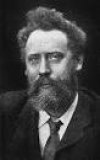Analysis of London Types: The Artist Muses At His Ease
William Ernest Henley 1849 (Gloucester) – 1903 (Woking)
The Artist muses at his ease,
Contented that his work is done,
And smiling-smiling!-as he sees
His crowd collecting, one by one.
Alas! his travail's but begun!
None, none can keep the years in line,
And what to Ninety-Eight is fun
May raise the gorge of Ninety-Nine!
| Scheme | ABABBCBC |
|---|---|
| Poetic Form | |
| Metre | 01010111 01011111 01010111 11010111 0111101 11110101 01110111 11011101 |
| Closest metre | Iambic tetrameter |
| Characters | 274 |
| Words | 50 |
| Sentences | 6 |
| Stanzas | 1 |
| Stanza Lengths | 8 |
| Lines Amount | 8 |
| Letters per line (avg) | 26 |
| Words per line (avg) | 6 |
| Letters per stanza (avg) | 205 |
| Words per stanza (avg) | 47 |
Font size:
Submitted on May 13, 2011
Modified on March 05, 2023
- 15 sec read
- 46 Views
Citation
Use the citation below to add this poem analysis to your bibliography:
Style:MLAChicagoAPA
"London Types: The Artist Muses At His Ease" Poetry.com. STANDS4 LLC, 2024. Web. 29 Apr. 2024. <https://www.poetry.com/poem-analysis/40514/london-types%3A-the-artist-muses-at-his-ease>.


Discuss this William Ernest Henley poem analysis with the community:
Report Comment
We're doing our best to make sure our content is useful, accurate and safe.
If by any chance you spot an inappropriate comment while navigating through our website please use this form to let us know, and we'll take care of it shortly.
Attachment
You need to be logged in to favorite.
Log In